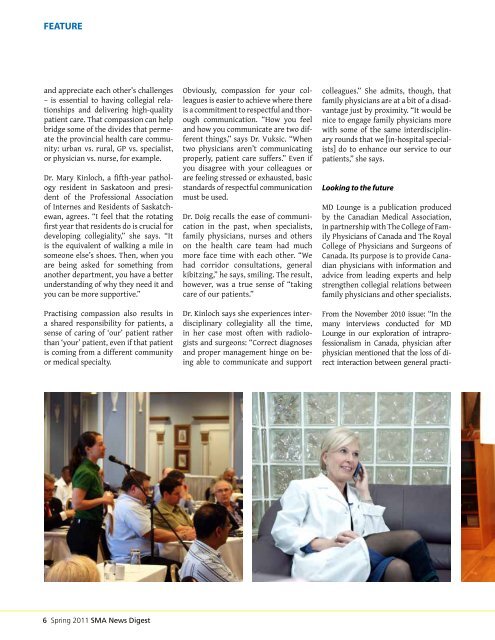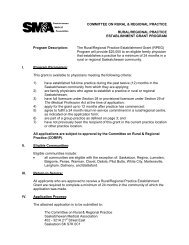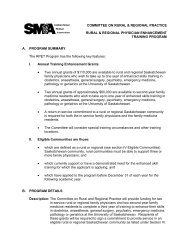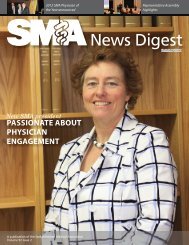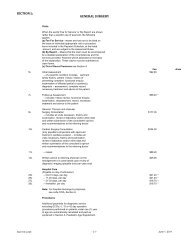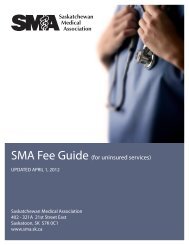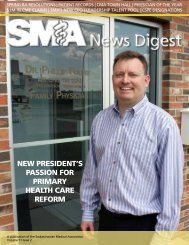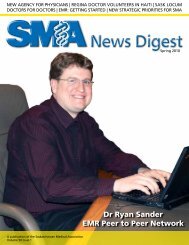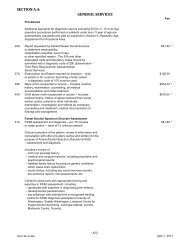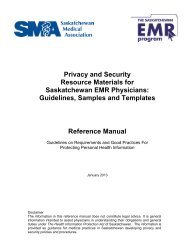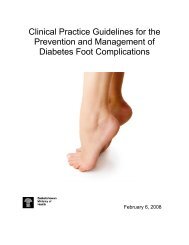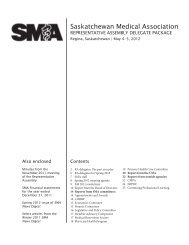Examining collegiality in Saskatchewan - Saskatchewan Medical ...
Examining collegiality in Saskatchewan - Saskatchewan Medical ...
Examining collegiality in Saskatchewan - Saskatchewan Medical ...
Create successful ePaper yourself
Turn your PDF publications into a flip-book with our unique Google optimized e-Paper software.
FEATURE<br />
and appreciate each other’s challenges<br />
– is essential to hav<strong>in</strong>g collegial relationships<br />
and deliver<strong>in</strong>g high-quality<br />
patient care. That compassion can help<br />
bridge some of the divides that permeate<br />
the prov<strong>in</strong>cial health care community:<br />
urban vs. rural, GP vs. specialist,<br />
or physician vs. nurse, for example.<br />
Dr. Mary K<strong>in</strong>loch, a fifth-year pathology<br />
resident <strong>in</strong> Saskatoon and president<br />
of the Professional Association<br />
of Internes and Residents of <strong>Saskatchewan</strong>,<br />
agrees. “I feel that the rotat<strong>in</strong>g<br />
first year that residents do is crucial for<br />
develop<strong>in</strong>g <strong>collegiality</strong>,” she says. “It<br />
is the equivalent of walk<strong>in</strong>g a mile <strong>in</strong><br />
someone else’s shoes. Then, when you<br />
are be<strong>in</strong>g asked for someth<strong>in</strong>g from<br />
another department, you have a better<br />
understand<strong>in</strong>g of why they need it and<br />
you can be more supportive.”<br />
Practis<strong>in</strong>g compassion also results <strong>in</strong><br />
a shared responsibility for patients, a<br />
sense of car<strong>in</strong>g of ‘our’ patient rather<br />
than ‘your’ patient, even if that patient<br />
is com<strong>in</strong>g from a different community<br />
or medical specialty.<br />
6 Spr<strong>in</strong>g 2011 SMA News Digest<br />
Obviously, compassion for your colleagues<br />
is easier to achieve where there<br />
is a commitment to respectful and thorough<br />
communication. “How you feel<br />
and how you communicate are two different<br />
th<strong>in</strong>gs,” says Dr. Vuksic. “When<br />
two physicians aren’t communicat<strong>in</strong>g<br />
properly, patient care suffers.” Even if<br />
you disagree with your colleagues or<br />
are feel<strong>in</strong>g stressed or exhausted, basic<br />
standards of respectful communication<br />
must be used.<br />
Dr. Doig recalls the ease of communication<br />
<strong>in</strong> the past, when specialists,<br />
family physicians, nurses and others<br />
on the health care team had much<br />
more face time with each other. “We<br />
had corridor consultations, general<br />
kibitz<strong>in</strong>g,” he says, smil<strong>in</strong>g. The result,<br />
however, was a true sense of “tak<strong>in</strong>g<br />
care of our patients.”<br />
Dr. K<strong>in</strong>loch says she experiences <strong>in</strong>terdiscipl<strong>in</strong>ary<br />
<strong>collegiality</strong> all the time,<br />
<strong>in</strong> her case most often with radiologists<br />
and surgeons: “Correct diagnoses<br />
and proper management h<strong>in</strong>ge on be<strong>in</strong>g<br />
able to communicate and support<br />
colleagues.” She admits, though, that<br />
family physicians are at a bit of a disadvantage<br />
just by proximity. “It would be<br />
nice to engage family physicians more<br />
with some of the same <strong>in</strong>terdiscipl<strong>in</strong>ary<br />
rounds that we [<strong>in</strong>-hospital specialists]<br />
do to enhance our service to our<br />
patients,” she says.<br />
Look<strong>in</strong>g to the future<br />
MD Lounge is a publication produced<br />
by the Canadian <strong>Medical</strong> Association,<br />
<strong>in</strong> partnership with The College of Family<br />
Physicians of Canada and The Royal<br />
College of Physicians and Surgeons of<br />
Canada. Its purpose is to provide Canadian<br />
physicians with <strong>in</strong>formation and<br />
advice from lead<strong>in</strong>g experts and help<br />
strengthen collegial relations between<br />
family physicians and other specialists.<br />
From the November 2010 issue: “In the<br />
many <strong>in</strong>terviews conducted for MD<br />
Lounge <strong>in</strong> our exploration of <strong>in</strong>traprofessionalism<br />
<strong>in</strong> Canada, physician after<br />
physician mentioned that the loss of direct<br />
<strong>in</strong>teraction between general practi-


